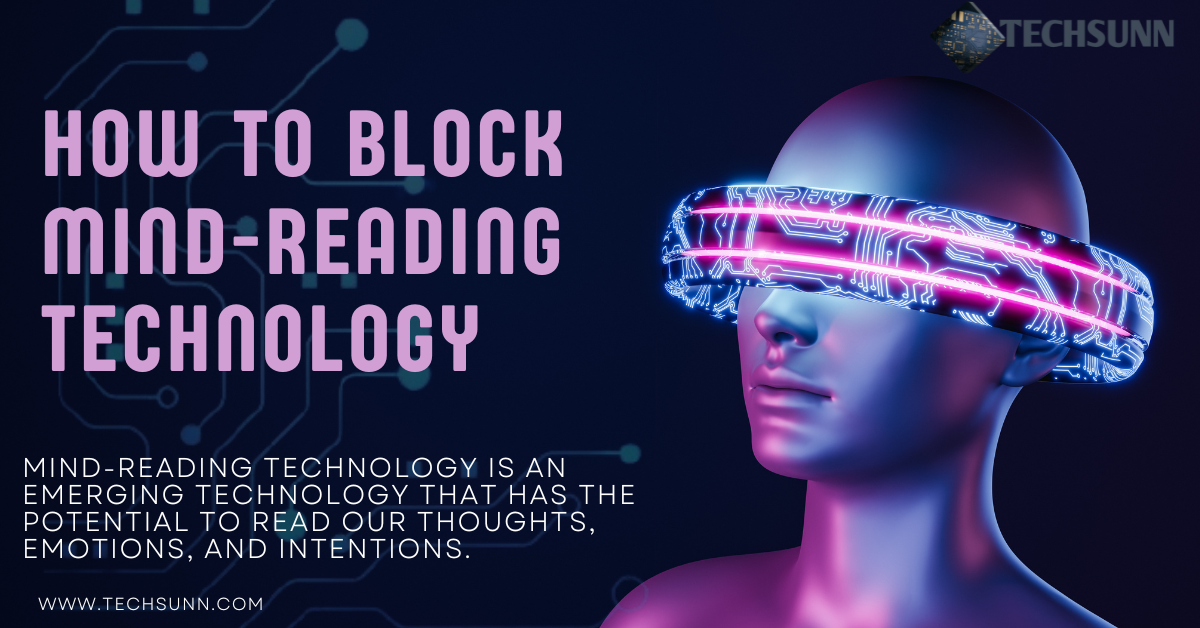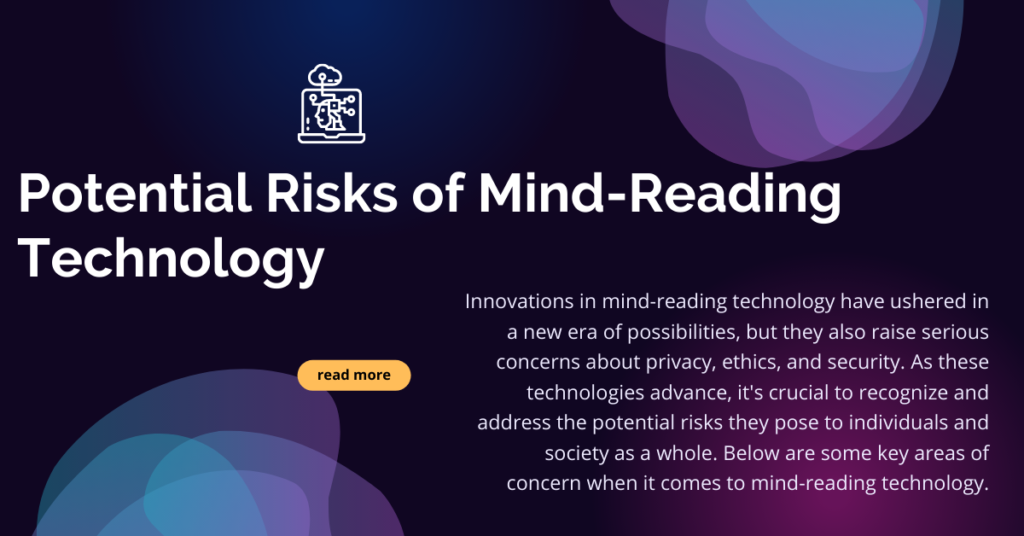Protecting Your Thoughts: How To Block Mind-reading Technology

Learn how to block mind-reading technology. Protect your thoughts,emotions ensure mental privacy in a connected world. Effective strategies revealed. Protecting your mental privacy from mind-reading technology is a growing concern in today’s technological landscape. By adopting a combination of awareness, mindfulness, and proactive strategies, you can mitigate the risks associated with invasive technologies. Remember that staying informed, practicing mental control, and seeking expert advice are your best tools in safeguarding your thoughts and maintaining your personal boundaries.
How To Block Mind-Reading Technology
How to Block Mind-Reading Technology is a pressing concern in today’s interconnected world. As this innovative technology advances, the need to safeguard our private thoughts and mental space becomes paramount. The potential for unauthorized access to our innermost thinking is a real and unsettling threat. In this article, we will explore effective strategies to protect your mind from invasive mind-reading technology.
In a world where technology continues to evolve at an astonishing pace, concerns about privacy and personal security are becoming more prevalent than ever. One of the emerging worries is the potential for mind-reading technology to invade our thoughts and steal our most intimate secrets. While this might sound like something out of a science fiction movie, recent advancements in brain-computer interfaces and neural networks have brought this concept closer to reality. In this article, we will explore various strategies and techniques to help you protect your mind from unauthorized access and maintain your mental privacy.
The rapid evolution of neural interfaces and brain-computer interactions has opened up new possibilities for deciphering human thoughts. However, this also raises ethical and privacy concerns. To counteract these potential intrusions, individuals need to be proactive in defending their mental privacy.
Privacy-focused technologies are emerging as a frontline defense. Utilizing brainwave encryption systems and neural firewalls can establish virtual barriers, thwarting any attempts at unauthorized mind access. Additionally, staying informed about cutting-edge encryption techniques can significantly enhance your mental data security.
Education plays a pivotal role in maintaining privacy in the face of mind-reading advancements. By familiarizing yourself with the risks and signs of unauthorized access, you can detect and prevent potential breaches. Regular updates on privacy threats and protective measures are essential for staying ahead of emerging challenges.
Precautions To Take To Block Mind-reading Technology
Stay Mindful Of Your Surroundings
Maintaining awareness of your environment is crucial. Avoid discussing sensitive information in public spaces where your conversations might be overheard. Mind-reading technology often relies on picking up audio cues, so being vigilant about your surroundings can significantly reduce the risk of intrusion.
Explore Thought-Scrambling Apps
In the digital age, there’s an app for nearly everything, including protecting your thoughts. Thought-scrambling apps use sound frequencies or visual patterns to disrupt mind-reading signals, making it harder for technology to decipher your thoughts.
Wear Copper Bracelets
According to the insights provided in the article “How to Prevent Your Thoughts from Being Read by Mind-Reading Technology,” employing copper bracelets presents a potential solution for countering mind-reading technology. in addition Copper, recognized for its capacity to obstruct electromagnetic fields – the medium for thought reading – emerges as a key element in this strategy. furthermore by adorning yourself with copper bracelets, you establish a protective perimeter around your body, effectively impeding mind-reading technology’s access to your thoughts. While it’s important to note the absence of substantial scientific substantiation for this assertion, it’s worth acknowledging the considerable number of individuals who have shared positive outcomes stemming from this approach.
Stay Away From Electronic Gadgets
Modern electronic gadgets, including smartphones and computers, emit electromagnetic radiation capable of facilitating thought-reading endeavors. As outlined in the resource “How to Block Mind-Reading Technology,” a countermeasure involves minimizing exposure to electronic devices. This can be achieved by limiting their usage to necessities and maintaining a safe physical distance from these devices. Additionally, deactivating Wi-Fi and Bluetooth connections serves as an effective strategy to diminish the emission of electromagnetic radiation from the device.
Read Also : Custom Helmets that Resemble Your Actual Face
Don’t Look Into An Electromagnetic Field Directly
Based on recent research, maintaining the privacy of your thoughts from electromagnetic field (EMF) mind-reading technology involves avoiding direct gaze into the field. The study revealed that individuals who directly observed an EMF source exhibited more foreseeable brain activity, rendering their thoughts more decipherable by algorithms.
Avoid Reading Books On Electronic Devices
While reading books on electronic devices offers numerous advantages, including features like highlighting, bookmarks, and note-taking, there are also notable drawbacks. One significant downside is the susceptibility of your thoughts to mind-reading technology. If this is a concern, several measures can be taken to safeguard your thoughts from potential intrusion.
Potential Risks Of Mind-Reading Technology

Innovations in mind-reading technology have ushered in a new era of possibilities, but they also raise serious concerns about privacy, ethics, and security. As these technologies advance, it’s crucial to recognize and address the potential risks they pose to individuals and society as a whole. Below are some key areas of concern when it comes to mind-reading technology.
Privacy Intrusions
Mind-reading technology has the potential to access and interpret our innermost thoughts, blurring the line between private and public domains. Unauthorized access to mental content could lead to profound violations of personal privacy, as thoughts that were once considered private might become susceptible to interception and exploitation.
Data Security Vulnerabilities
With the ability to read and transmit neural signals, mind-reading technology opens up new avenues for data breaches. Hackers or malicious actors might exploit vulnerabilities in neural interfaces or brain-computer communication to gain unauthorized access to sensitive cognitive information, putting individuals at risk of identity theft or manipulation.
Ethical Dilemmas
The ethical implications of mind-reading technology extend to consent, autonomy, and consent. The ability to decipher thoughts could challenge our fundamental concepts of informed consent, as individuals might inadvertently reveal thoughts they never intended to share. Moreover, questions arise about whether it’s ethically sound to use this technology in various domains, such as law enforcement and employment.
Manipulation And Control
Mind-reading technology’s potential to influence and manipulate thoughts is a concerning aspect. If exploited, this technology could be used to alter perceptions, thoughts, or emotions, potentially leading to unethical coercion or mind control.
Bias And Discrimination
Algorithms used to interpret neural signals may inherit biases from the data they are trained on. This could result in discriminatory practices based on thoughts or emotions, reinforcing existing societal biases and injustices.
Mental Health Implications
The ability to access one’s thoughts could impact mental health, leading to increased anxiety, self-censorship, or paranoia. Fear of invasive mind-reading might discourage individuals from seeking help for mental health issues.
FAQs

How Does Mind-reading Technology Work?
Mind-reading technology often relies on brain-computer interfaces (BCIs) that interpret neural signals and translate them into commands. These BCIs can be invasive or non-invasive, and they have applications in medical research, but concerns about privacy have emerged.
Is Mind-reading Tech Possible?
An AI-based decoder that can translate brain activity into a continuous stream of text has been developed, in a breakthrough that allows a person’s thoughts to be read non-invasively for the first time.
What Techniques Are Used In Mind-reading Computer?
Mind-reading devices make use of facial expressions of people in knowing what they feel. The goal of such a device is to increase the interaction between a computer and a human being. It needs the use of a digital video camera that records human expressions.
Is Mind-reading Technology Already In Use?
Mind-reading technology is still in its experimental stages, but advancements are being made in various fields such as neuroscience and artificial intelligence.
Can Meditation Truly Protect Against Mind-reading Technology?
While meditation can enhance mental resilience, it’s not a foolproof method against advanced mind-reading techniques.
Are There Any Legal Regulations For Mind-reading Technology?
As of now, legal regulations regarding mind-reading technology are limited. However, discussions about ethical and privacy concerns are ongoing, and it’s crucial to stay informed about any potential developments in this area.
Can Meditation Really Help In Blocking Mind-reading?
Meditation can enhance your mental control and focus, which might help you resist external intrusion to some extent. therefore it’s not a foolproof method, incorporating meditation into your routine can contribute to your overall mental well-being.
What Is The Role Of Legislation In Preventing Mind-reading Technology Abuse?
Legislation plays a vital role in setting boundaries and ensuring responsible use of mind-reading technology to protect individual rights.
Are There Any Consumer Devices Available For Protecting Mental Privacy?
Some experimental devices claim to protect against mind-reading technology, but their effectiveness is still under debate.


